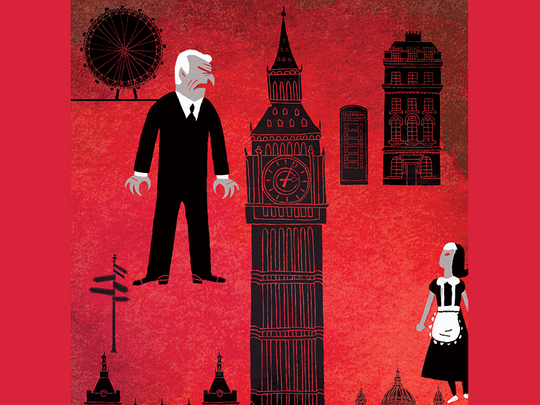
Paradise City
By Elizabeth Day, Bloomsbury USA, 368 pages, $27
Novels in which separate story lines collide often give the impression that even the most disparate people are somehow connected. And when that collision occurs through an act of violence, it’s sometimes assumed that other differences can be ignored — because, after all, what life has been lived without some pain and suffering? At best, such stories come across as saccharine odes to our shared humanity. But in a novel such as Elizabeth Day’s tale of contemporary London, “Paradise City”, they can seem to exploit the circumstances of the less fortunate and the marginalised.
A feature writer for “The Observer”, Day opens her third novel with a brief scene inspired by the scandal involving Dominique Strauss-Kahn and Nafissatou Diallo, the maid who accused him of sexually assaulting her in a New York hotel. Sir Howard Pink, a self-made millionaire in his 60s with a fashion empire and an “ever so slightly more corpulent form”, checks into a London hotel, where he forces himself upon a maid. Despite what he assumes, his victim, Beatrice Kizza, would never have consented to his advances, and even the government knows it.
To her credit, Day doesn’t depict Howard as a one-dimensional lecher. Yet the gloomy reasoning she gives for his actions won’t suffice: 11 years earlier, his teenage daughter, Ada, went missing and has never been found. Tormented by this unresolved trauma, he sequesters himself in a hotel once a month for solitary grieving and introspection — and, it appears, whatever else might result.
Ada also links Howard to the novel’s two other major characters. Esme Reade, an ambitious but disillusioned reporter for a weekend tabloid, forms an unexpected bond with Howard when he learns that her father died in a drunken-driving accident when she was 8; she later secures the first interview he has given since his daughter’s disappearance. Carol Hetherington, newly widowed, lives an unassuming life in a quiet neighbourhood — until she makes a macabre discovery in her neighbour’s garden.
The plot’s uniting of this foursome around the fate of a white teenager from a wealthy family reflects a larger problem in British society, where an ever growing number of immigrants, particularly from Africa, the Indian subcontinent and Asia, feel that their concerns are being ignored by both the government and their neighbours.
Beatrice suffers the same fate at Day’s hands. The horrors of her life, including an even more violent sexual attack that took place back in Uganda and her constant fear that her partner will never join her in England, are carefully detailed, but they’re eclipsed by the novel’s fixation with Ada and with Ada’s father’s tortured soul.
While Beatrice is determined “to stop being a faceless person among the masses of other faceless people afraid to make a noise, fearful of disrupting the precarious equilibrium of their existence”, can she possibly be anything but “a nobody” here? Considering how Ada’s ghost haunts most of the chapters dedicated to Beatrice’s perspective, the game feels rigged against her.
Day’s physical descriptions of London — from its “grimy rib cage” that “seems to lift and expand” on rare sunny mornings to its inhabitants who “tsk-tsk at tourists taking too long to understand the tube map” — reveal her sensitivity to nuanced detail. But the way the priorities of “Paradise City” so accurately represent the troubling state of today’s Britain is an unlikely, and far from ideal, testament to her skill as a writer.
–New York Times News Service








